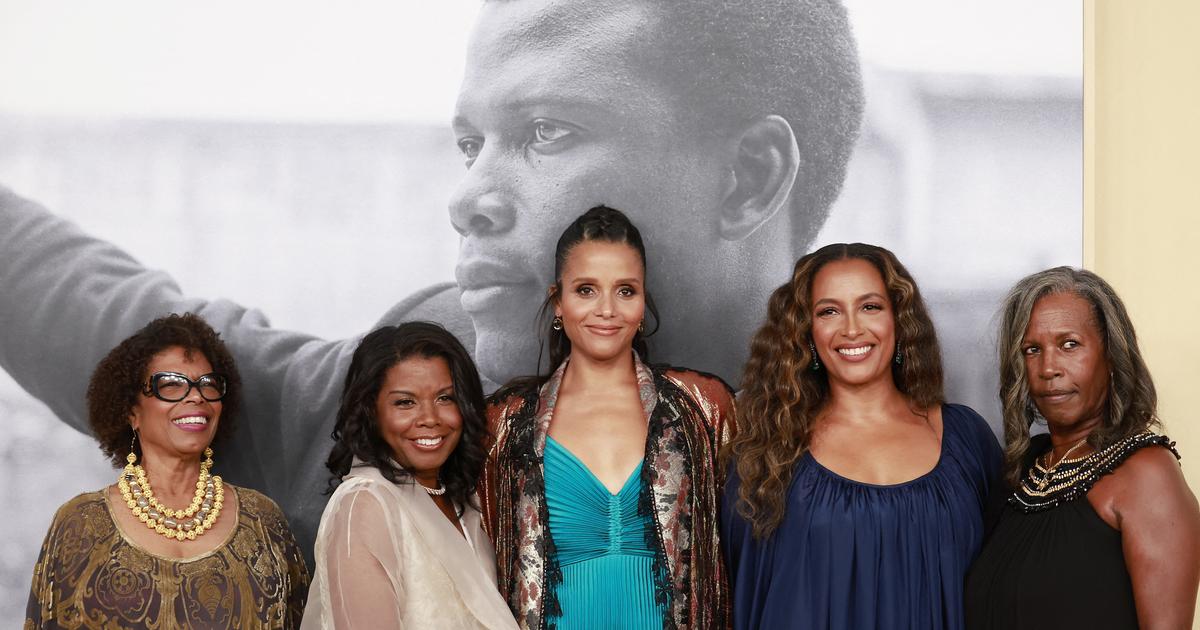New documentary from Apple TV+,
Sidney looks
back on the career of Hollywood's first big black star Sidney Poitier, including criticism from African-American activists and intellectuals who accused him of playing stereotypical roles for white audiences, in the midst of the civil rights movement.
Produced by Oprah Winfrey and featuring the likes of Denzel Washington and Morgan Freeman, Barbra Streisand and Robert Redford,
Sidney
- out Friday - aims to demonstrate why these accusations were unfair to the actor, who died in January at age 94 years old.
“The reality is, ever since the invention of cinema, there have always been these demeaning images of black Americans. And Sidney Poitier single-handedly destroyed, film after film, these images,”
Sidney
director Reginald Hudlin told AFP
.
Describing the actor who rose to fame in the 1960s as a
'warrior'
on racial issues, he explains:
'Without him you don't have me, and you don't have Oprah Winfrey or Barack either. Barack Obama”
.
Oprah Winfrey is also present in the documentary since
Sidney
contains interviews that the actor gave to the television presenter, years before his death.
The film also tackles thorny subjects such as Sidney Poitier's extramarital affair during his first marriage to Juanita Hardy.
A subject that can anger those concerned but that did not prevent Juanita Hardy and the couple's three daughters from answering the director's questions for the documentary.
“When I first sat down with the family to discuss the possibility of making this movie, I asked:
Is there anything I can't talk about?
And I specifically mentioned this example
,” says Reginald Hudlin.
“They answered me:
No, no, no, we want to tell the whole truth.
I appreciated the gesture and the fact that they were not just there to tell what we already know.
The film also evokes terrifying moments of racist violence experienced by the actor.
In 1964, Sidney Poitier and singer Harry Belafonte were chased in Mississippi by armed Ku Klux Klan members while delivering money to a suffrage movement.
An earlier run-in with the KKK, and another with a white policeman who harassed a teenaged Sidney Poitier at gunpoint, are featured in the film as triggers in his often-hidden fight for the American rights movement. civics.
"That's what's fascinating about him: he never let himself be broken, he never sank into resentment
," explains Reginald Hudlin.
Read alsoSidney Poitier is dead, Hollywood loses a new star and a hero of the black cause
Sanitized Hero
But perhaps the most contested part of the actor's legacy is the nickname "Uncle Tom" sometimes thrown at him, a reference used in the United States and which implied that he would have been too docile. towards white audiences and Hollywood.
The documentary thus evokes a
New York Times
article dated 1967 entitled
“Why does white America love Sidney Poitier so much?”
, and who accuses the actor of
“essentially playing the same role”
, that of the sanitized and flat hero.
A
"Sidney Poitier syndrome"
is also described in the article, that of
"a good guy in a white world, without a wife, without a lover, without a woman to love or kiss, helping the white man to solve the problem of the white man"
.
Three years earlier, he had become the first black actor to win an Oscar for
Le Lys des champs
, in which he plays a traveling handyman, who helps a community of white nuns with whom he eventually befriends .
Other roles, such as the beggar in
Porgy and Bess
, have been described as racist by some critics.
According to Reginald Hudlin, the blame
"was an inevitable consequence of the job he was doing"
and Sidney Poitier, who
"knew it was coming"
, was more interested in embodying the African-American experience on screen. .
"I think now we can look at it with a broader historical perspective, and conclude that these decisions made by Sidney Poitier were right and helped the social movement to move forward,"
he pleads.
The documentary also highlights the groundbreaking nature of Sidney Poitier's kiss with white actress Katharine Houghton in
Guess Who's Coming to Dinner
, and the scene in
In the Heat of the Night
where he slaps a white Southern aristocrat.
“There was no precedent for who he was and what he did
,” concludes Reginald Hudlin.


/cloudfront-eu-central-1.images.arcpublishing.com/prisa/U5K6GQUZTZACJAGDURPGR6UIOU.jpg)






